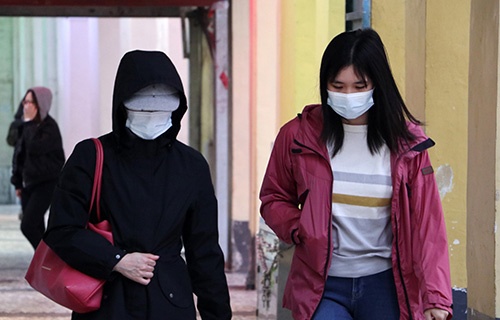De WHO beveelt in het algemeen geen gezichtsmaskers aan aan gezonde mensen. CDC heeft nu echter een nieuwe richtlijn opgesteld en zegt: "mensen moeten stoffen maskers dragen als ze naar buiten gaan". Nieuw bewijs suggereert dat het gebruik van chirurgische gezichtsmaskers de verspreiding van menselijke coronavirussen en griepvirussen door symptomatische personen zou kunnen voorkomen.
Covid-19 virus is aanwezig in uitgeademde lucht en hoesten van geïnfecteerde personen en verspreidt zich via druppeltjes in de lucht van hoesten en niezen.
Er is discussie geweest over de werkzaamheid van gezicht maskers in reducing spread of the virus. The international body WHO doesn’t recommend them generally to the healthy people. However, CDC has now laid down new guideline and say ”people should wear cloth masks when they go outside”.
In the brief communication published in Nature Medicine on 03 April 2020, the researchers found that the usage of surgical face masks could prevent spread of human coronaviruses and influenza virussen from symptomatic individuals.
Ademhalings virus infections spread between human beings through contact, respiratory droplets and fine-particle aerosols. However, there are uncertainties around modes of transmission of COVID-19.
In this study, the researchers quantified the amount of virus in exhaled breath of participants and determined the potential efficacy of surgical face masks in preventing the transmission. Of 3,363 screened individuals, 246 individuals provided exhaled breath samples The 50% participants were randomized to ‘not wearing a face mask’ during the exhaled breath collection and the rest were randomized to ‘wearing a face mask’. They tested viral shedding in nasal swabs, throat swabs, respiratory droplet samples and aerosol samples and compared the latter two between samples collected with or without a face mask.
They found viral shedding to be higher in nasal swabs than in throat swabs. Further, they detected coronavirus in 30-40% samples collected from participants without face masks but no virus was detected in droplets and aerosols collected from patients wearing face masks.
This study demonstrated the efficacy of surgical masks in reducing coronavirus detection and viral copies in respiratory droplets and in aerosols suggesting that the surgical face masks could be used by ill people to reduce onward transmission of the virus.
***
Referentie:
Leung, N.H.L., Chu, D.K.W., Shiu, E.Y.C. et al. Respiratory virus shedding in exhaled breath and efficacy of face masks. Published on 03 April 2020. Nature Medicine (2020). DOI: https://doi.org/10.1038/s41591-020-0843-2






































